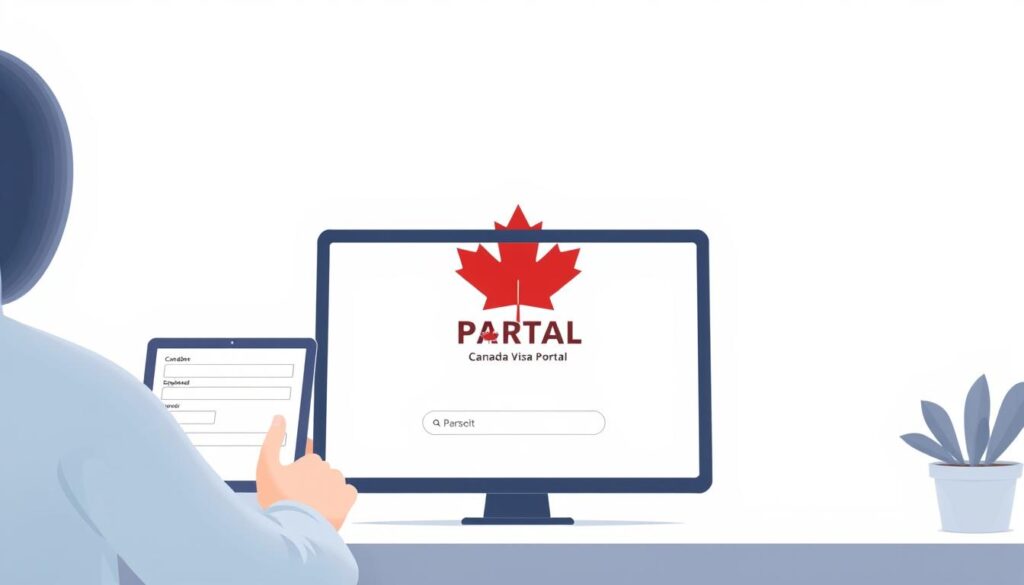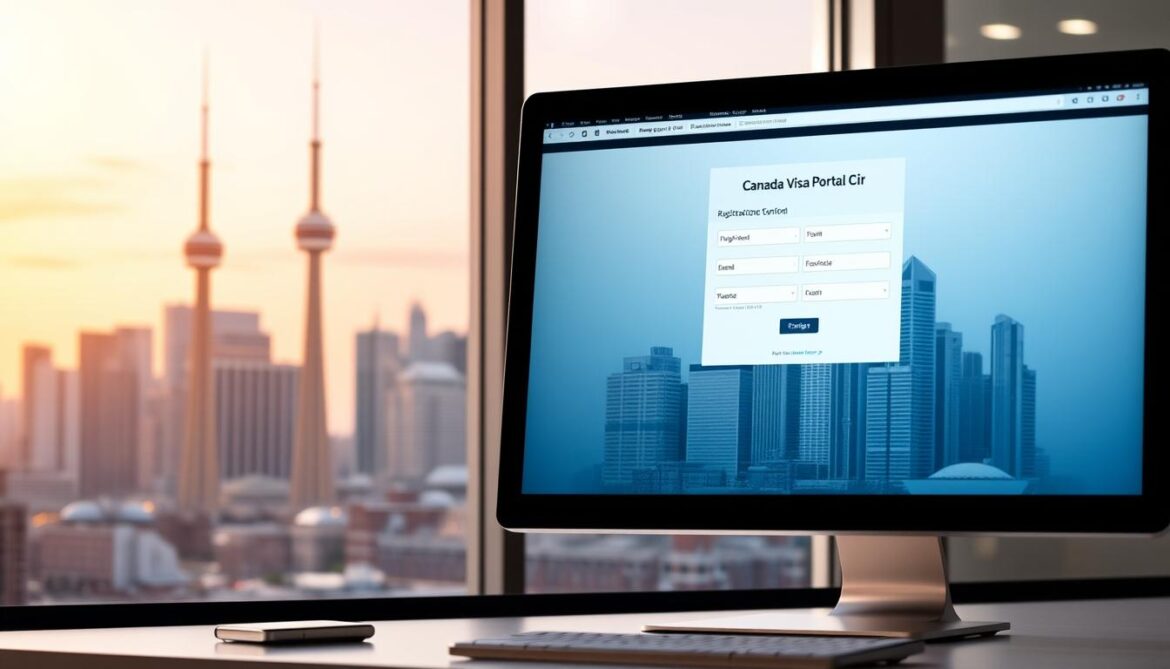Did you know that over 2.8 million Canadians live outside the country? Whether you’re traveling or residing overseas, staying connected with the Government of Canada is crucial for your safety.
The Canada Visa Portal offers a streamlined way to notify officials of your international travels. This free, confidential service ensures you receive emergency updates and consular assistance when needed.
Managed by Global Affairs Canada, the platform is mobile-friendly and accessible worldwide. It’s available to citizens and select travelers from partner nations like Australia and Israel.
By using this official channel, you help authorities provide faster support during crises. The service was last updated on December 5, 2024, reflecting current travel protocols.
Why You Should Register as a Canadian Abroad
Staying safe while traveling starts with being informed. The government support system ensures you receive important information directly, from weather warnings to security updates.

Benefits of Registration
You’ll get real-time alerts about safety changes at your destination. This includes updates to travel advice advisories and health risks. During crises like hurricanes, authorities coordinate evacuations faster.
Families also benefit. If an emergency happens back home, officials can help reunite you with loved ones quickly.
Emergency Situations and Government Support
Natural disasters or civil unrest require immediate action. Registered travelers receive:
- Priority consular communication during local outbreaks.
- Evacuation plans tailored to your location.
- Direct notifications about shelter options.
In 2019, Ottawa highlighted how this system improved government support during global crises.
Eligibility Criteria for Registration
Understanding who qualifies for this service helps streamline your travel preparations. The portal prioritizes safety for specific groups, with clear guidelines on documentation and destinations.

Canadian Citizenship Requirements
Canadian citizens must present a valid passport or citizenship certificate. This ensures authorities verify your identity during emergencies. Dual nationals should use their Canadian credentials for faster support.
Domestic travel within the country doesn’t require registration. The service focuses on international trips where consular assistance might be needed.
Special Cases for Australian and Israeli Citizens
Australians visiting select nations can also use the portal. Eligible destinations include:
| Country | Coverage Details |
|---|---|
| Algeria | Full consular support |
| Cuba | Emergency alerts only |
| Tunisia | Health risk notifications |
Israeli citizens in Palestinian territories (West Bank/Gaza) receive tailored updates. Non-citizens traveling with family members must be linked through a Canadian citizen’s registration.
For mixed-nationality groups, the primary registrant should list all companions. Government offices can clarify complex cases.
How to Register as a Canadian Abroad
Planning an international trip? Secure your safety with these simple steps. The process ensures you receive critical updates and assistance when needed.

Step 1: Access the Canada Visa Portal
Visit the official portal using a secure link. Have your passport and itinerary copies ready. These documents speed up the process.
Step 2: Provide Personal and Travel Details
Enter mandatory fields like your date of birth and accommodations. Include your return date to help officials track your stay. Groups of up to 15 can submit together.
Step 3: Add Emergency Contact Information
List _emergency_ contacts with properly formatted international phone numbers. Example: +1 613 555 0187. Notify family friends about your registration.
Step 4: Submit and Confirm Your Registration
Review all details before finalizing. A confirmation email arrives within 24–48 hours. Keep it handy for reference during your travel.
Registering for Multiple Destinations or Group Travel
Exploring multiple countries on one trip? Simplify your safety preparations with these tips. The portal’s flexible design handles complex itineraries, from family vacations to corporate retreats.

Adding Additional Destinations
For multi-stop travel, list each location separately. Cruise itineraries need individual port entries—a 7-day Mediterranean journey requires seven submissions.
Tips for efficiency:
- Upload your full itinerary to avoid manual entry errors.
- Update dates if plans change mid-trip.
- Business groups can attach conference schedules.
Group Registration Process
Families or teams of up to 15 can register together. A parent or lead traveler submits the main form, then adds members’ details.
Real-world examples:
- Family of 5: Parents link three children under one account.
- Corporate delegation: HR managers pre-register employees for conferences.
After the initial 15, use sequential additions for larger groups. The service saves frequent travelers’ profiles for future trips.
Updating Your Registration Details
Life changes quickly—make sure your safety details stay up to date. Whether extending your trip or switching accommodations, timely updates help authorities assist you faster.
Online Updates
Log into the portal dashboard to edit your itinerary or contact information. Verify changes with your passport date to prevent errors. Frequent travelers save time with pre-filled forms.
For security, email updates to [email protected] require answers to preset questions. Attach scanned documents if relocating longer than 30 days.
Updating via Email or In-Person
Visit any of the 170+ embassies worldwide for face-to-face support. Staff verify your identity using government-issued ID before processing requests.
Example: A family updating emergency contacts mid-trip submits a signed form. The embassy’s locator tool helps find the nearest office.
Privacy and Security of Your Information
Your personal details deserve top-tier protection when traveling internationally. The Canada Visa Portal uses strict protocols to safeguard your privacy and comply with government regulations.

How Your Data Is Protected
256-bit SSL encryption secures all submissions, matching banking-grade standards. This prevents unauthorized access to your information during transmission.
The system adheres to Canada’s Privacy Act, ensuring:
- No third-party sharing without explicit consent
- Regular audits of security protocols
- Immediate breach notifications
| Security Feature | Protection Level |
|---|---|
| Encryption | 256-bit SSL (equal to EU GDPR) |
| Access Controls | Two-factor authentication for staff |
Data Retention Policies
Your travel information is automatically deleted 12 months after your return date. For example, a trip ending March 15, 2025, triggers removal on March 15, 2026.
Key exceptions include:
- Ongoing emergencies may extend retention briefly
- Legal investigations require archived records
“Global Affairs Canada destroys 99.8% of traveler data within the 12-month window.”
Pre-Travel Checklist for Canadians Abroad
Smart travelers know preparation is key to staying safe abroad. These steps help you and your family stay connected during international trips. From digital backups to emergency protocols, each detail matters when you’re far from home.
Sharing Your Itinerary with Loved Ones
Create a shared digital itinerary using tools like Google Sheets. Include flight numbers, hotel addresses, and local contact information. This lets friends or relatives track your progress effortlessly.
Always carry physical copies too. Use this simple format:
- Hotel confirmations with check-in dates
- Local embassy address printed on cardstock
- Medical insurance details in your wallet
Emergency Contact Numbers to Save
Program these critical numbers before departure:
| Service | Contact Method |
|---|---|
| Emergency Watch and Response Centre | +1 613 996 8885 |
| Global Affairs Canada SOS | [email protected] |
Research destination-specific contacts. For example, the Mexico City embassy handles 300+ cases monthly. Save local police and hospital numbers in your phone’s favorites.
Remember: Update your emergency details if travel plans change. A few minutes now can save hours during crises.
Common Questions About Registration
Travelers often have questions about staying safe while overseas. Below, we clarify key concerns to help you make informed decisions.
Registering for Cruises or Domestic Travel
Planning a Caribbean cruise? List each port separately. For example, a 7-day trip stopping in Jamaica and the Bahamas requires two submissions.
Domestic trips within provinces don’t need registration. The services focus on international destinations where consular assistance might be required.
| Travel Type | Registration Needed? |
|---|---|
| Cruises | Yes (per port) |
| Domestic flights | No |
What If You Don’t Register?
Consular help remains available, but delays may occur. In 2018, over 1,000 medical cases were handled for unregistered citizens.
Limitations include:
- Slower emergency response during crises.
- No automatic travel advice updates for your location.
“The Consular Services Charter guarantees aid, but registration prioritizes your case.”
Conclusion
Staying connected with official channels ensures smoother travels. The government service provides real-time alerts and faster emergency support when you need it most.
Before your next trip, verify health coverage and bookmark Travel.gc.ca. Seasonal advisories update frequently—check them for your destination.
Secure your safety today. A quick registration keeps you informed and prepared wherever you go.



